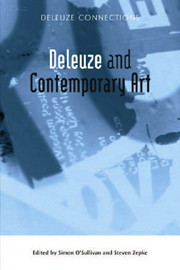Book contents
- Frontmatter
- Contents
- Acknowledgements
- List of Illustrations
- Introduction: Deleuze and Guattari and Contemporary Art
- POLITICS
- THE AESTHETIC PARADIGM
- SCENES AND ENCOUNTERS
- 9 An Art Scene as Big as the Ritz: The Logic of Scenes
- 10 Abstract Humour, Humorous Abstraction
- 11 From Aesthetics to the Abstract Machine: Deleuze, Guattari and Contemporary Art Practice
- 12 Traps Against Capture
- TECHNOLOGIES
- Notes on Contributors
- Index
12 - Traps Against Capture
from SCENES AND ENCOUNTERS
Published online by Cambridge University Press: 12 September 2012
- Frontmatter
- Contents
- Acknowledgements
- List of Illustrations
- Introduction: Deleuze and Guattari and Contemporary Art
- POLITICS
- THE AESTHETIC PARADIGM
- SCENES AND ENCOUNTERS
- 9 An Art Scene as Big as the Ritz: The Logic of Scenes
- 10 Abstract Humour, Humorous Abstraction
- 11 From Aesthetics to the Abstract Machine: Deleuze, Guattari and Contemporary Art Practice
- 12 Traps Against Capture
- TECHNOLOGIES
- Notes on Contributors
- Index
Summary
I cannot tell now whether escape was possible but I believe it must have been; for an ape it must always be possible.
Kafka, ‘A Report to an Academy’Talking of traps solely in terms of capture is always too simple because it cuts out whatever else they might articulate. And it is too lazy because it avoids whatever else needs to be thought in order that capture can multiply and become plural, complicated and un-captured. Indeed, talking of capture as if it were finite means giving into it; it is to be captured by capture. Such a framing consolidates capture into a given state and condition, yet it is precisely the opposite that is needed: capture needs to be undone and re-configured to allow for the invention of new ways out.
Closure only happens, if it ever does, because it is brought to a situation. Immanent to the situation there is always more, so long as you refuse to give up on other possibilities, and the more capture seems complete, the more urgently this ‘more’ needs to be mobilised through a whole different set of attitudes. If ‘an attitude of resignation is out of the question’ (Nancy 2000: 54), one possible attitude against capture is that form of humour Deleuze describes as intrinsically lateral, which spreads milieus sideways and which he differentiates from irony operating as yet another stratifying regime of signification.
- Type
- Chapter
- Information
- Deleuze and Contemporary Art , pp. 208 - 224Publisher: Edinburgh University PressPrint publication year: 2010

